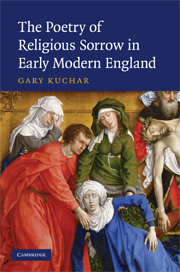Book contents
- Frontmatter
- Contents
- Acknowledgments
- Abbreviations and notes on texts
- Introduction: Of Sighs and Tears
- Chapter 1 The poetry of tears and the ghost of Robert Southwell in Shakespeare's Richard II and Milton's Paradise Lost
- Chapter 2 The poetry of tears and the metaphysics of grief: Richard Crashaw's “The Weeper”
- Chapter 3 The poetry of tears and the metaphysics of grief: Andrew Marvell's “Eyes and Tears”
- Chapter 4 Sad delight: Theology and Marian iconography in Aemilia Lanyer's Salve Deus Rex Judaeorum
- Chapter 5 Petrarchism and repentance in John Donne's Holy Sonnets
- Chapter 6 John Donne and the poetics of belatedness: Typology, trauma, and testimony in An Anatomy of the World
- Conclusion
- Index
- References
Chapter 5 - Petrarchism and repentance in John Donne's Holy Sonnets
Published online by Cambridge University Press: 22 September 2009
- Frontmatter
- Contents
- Acknowledgments
- Abbreviations and notes on texts
- Introduction: Of Sighs and Tears
- Chapter 1 The poetry of tears and the ghost of Robert Southwell in Shakespeare's Richard II and Milton's Paradise Lost
- Chapter 2 The poetry of tears and the metaphysics of grief: Richard Crashaw's “The Weeper”
- Chapter 3 The poetry of tears and the metaphysics of grief: Andrew Marvell's “Eyes and Tears”
- Chapter 4 Sad delight: Theology and Marian iconography in Aemilia Lanyer's Salve Deus Rex Judaeorum
- Chapter 5 Petrarchism and repentance in John Donne's Holy Sonnets
- Chapter 6 John Donne and the poetics of belatedness: Typology, trauma, and testimony in An Anatomy of the World
- Conclusion
- Index
- References
Summary
By making unusually explicit the shared cultural assumption that the capacity for godly sorrow is tensed as feminine in early modern England, Lanyer figures women as possessing a greater ability to experience the reciprocity of empathic, selfless, love for Christ than men. If Lanyer had seen any of John Donne's Holy Sonnets in manuscript, she would have had good reason for making such a gendered claim. For Donne, the compassio that Lanyer depicts as “feminine” in nature is psychically violent, even traumatizing. In this respect, the same cultural discourse that provided Lanyer with a way of representing women as having unmediated access to the sad delight of incarnationist theology, inspired in Donne a psycho-spiritual crisis. Like Lanyer's depiction of men in Salve Deus, the speakers of Donne's Holy Sonnets are not naturally inclined to the life of faith, especially when it comes to opening themselves to the terrifying intimacy of God within the soul. On the contrary, most of the poems depict the devotional life as a counter-intuitive struggle. And whereas Lanyer takes the theological and devotional amorphousness of Jacobean England as an occasion for synthesizing pre-Tridentine iconography with Lutheran ecclesiology, Donne experiences the multiplicity of coexisting devotional practices and theological systems in early seventeenth-century England as a significant religious problem.
- Type
- Chapter
- Information
- The Poetry of Religious Sorrow in Early Modern England , pp. 151 - 183Publisher: Cambridge University PressPrint publication year: 2008



